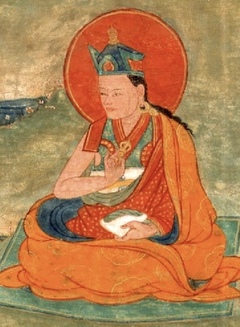Advice for Könchok Tenzin
Advice for Könchok Tenzin[1]
from The Essential Amrita of Profound Meaning: Oral Instructions and Practical Advice Bestowed Upon Fortunate Followers, Eye-Opener to What Is to Be Adopted and Abandoned
by Chokgyur Lingpa
You see piles of ordinary pebbles
As all manner of precious medicinal stones.
To you, Sage, I prostrate.
oṃ nare nore svāhā
When the deluded Könchok Tenzin was traveling
Through the land that is polished by the humble,
He presented a dark blue crystal
Made from the mighty blue lapis lazuli and arura,
And, with a great racket, entreated me to accept it as an offering for a teaching.
I wrote this in response, while laughing, amazed and amused.
Regarding all such ideas,
And for medical treatment and examination to go well,
You should supplicate like this:
In order that the medical treatment for the illnesses
Of the body’s four elements may go well,
Study well The Four Tantras.[2]
Even though they may be old, you should rely on and learn from experts.
So that the wisdom treatment for the illnesses
Of the afflictions, the five poisons, may go well,
You should study the sūtras and tantras,
And, even though they may be old, rely on and learn from a guru.
Moreover, if you don’t develop renunciation,
The root of your Dharma practice will be rotten.
In case you don’t know what renunciation is,
It means longing for freedom from saṃsāra.
Pursuing a living for your own gain
And saying you want to help others—these are empty words.
You say it’s all for the benefit of others,
But in reality, you’re just gathering offerings for yourself.
Gurus who are focused on personal gain
Are ensnared in their selfish desires.
Leaders who claim to be caring lovingly for their people,
But who create laws for their own benefit and gain—
They may be leaders by name, but in fact they are shameless.
Their hearts thump and pound when imposing their laws,
But when confronted by a Dharma monarch, they are humbly brought down.
These days everyone, high and low,
Does everything the wrong way around.
Your wish and hope is that everything goes well,
But you don’t place your trust in the Three Jewels.
How I pity your poor countries!
Relying on spiritual friends
Who are well-versed in the practices of the two traditions,[3]
And on elders who’ve been through both suffering and joy,
And on those who are honest, learned, and outstanding,
You should act with care and precision.
If, on the other hand, you carelessly engage
In spiritual and secular tasks,
Then all the gurus will become frauds,
All the monks will violate their vows,
All the tantric practitioners will corrupt their samayas,
All the leaders will fall and become civilians,
All the doctors will become butchers,
All beings will encounter suffering,
And all women will be debased.
So, don’t busy yourself with lots of activities, flitting from this to that.
Be steadfast, broad-minded, focus your mind on what is wholesome.
Consult experts, listen to elders’ advice.
If it’s an unusual situation, analyze it thoroughly.
If it’s of great importance, apply yourself with fortitude and courage.
To act in this way is in harmony with both the Dharma and the mundane world.
Whatever you do, keep the Three Jewels in your heart.
Then everything you do will be virtuous.
May this discourse, the spring queen’s melodious song,
Sail in the boat of virtue and spread to every land.
May the sprout of bliss and joy beautify the earth
And be enjoyed as the glorious queen of the perfect summer!
A physician clothed in red who was enjoying the meadows placed a pouch full of stones in front of me. He offered a piece of raw copper, and said he needed a supplication. But then, absorbed in the children’s game of stones, for a while I didn’t respond. Then, since the secretary Lama Chögyal kept on asking me, pleading so much that my ears began to ache, in the midst of these intelligent people, I finally spoke whatever came to mind in verse, laughing all the while, and Khenpo Rinchen Dargyé acted as the scribe.
| Samye Translations, 2024.
Bibliography
Source Text
mchog gyur gling pa, “rjes 'jug skal bzang rnams la bstsal pa’i zhal gdams bslab bya nyams len gyi skor spang blang mig 'byed zab don snying gi bdud rtsi.” In mchog gling bka’ ’bum skor. Vol. 36 of mChog gling bde chen zhig po gling pa yi zab gter yid bzhin nor bu’i mdzod chen po, 119-122. Kathmandu, Nepal: Ka-nying Shedrub Ling Monastery, 2004.
Version: 1.0-20240202
